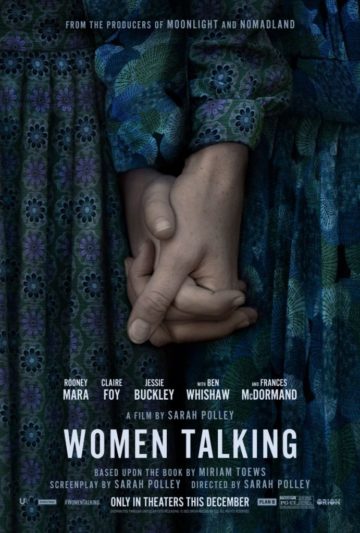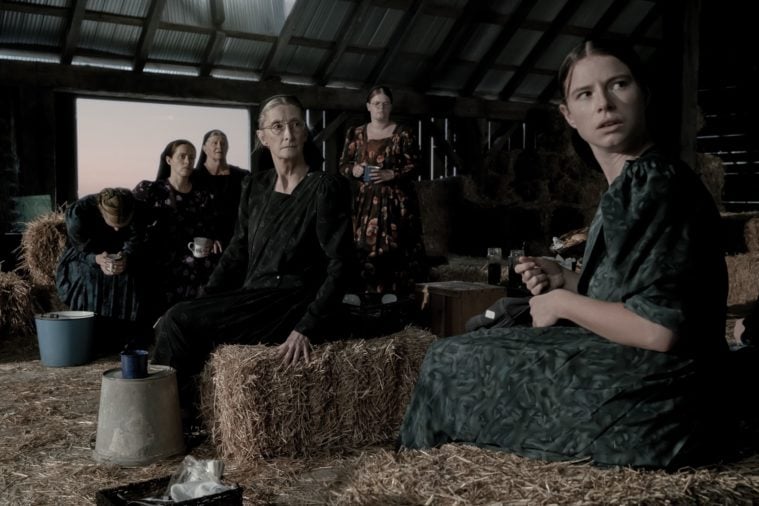In the adaptation of Miriam Toews’ novel, Women Talking, the innocuous act of conversing determines futures and fates. When yet another member of their Mennonite community is drugged and assaulted, eight women—of varying ages, tempers, and viewpoints—see that the time to consider their next steps is here. Should they stay and, somehow, fend for themselves? Pack up and leave for the unknown? What if inaction is also an option?

They all have 48 hours to choose before the men in the community return—assuming nothing will shorten the timeline.
Among the women who convene a meeting of the hayloft-based council, Agata Friesen (El Paso-born Judith Ivey) and Greta Loewen (Canada’s pride, Sheila McCarthy) are the matriarchs of their respective families. They also each have two daughters—the delicate Ona (Rooney Mara) and fearless Salome (Claire Foy) are Agata’s while the caustic Mariche (Jessie Buckley) and sincere Mejal (Michelle McLeod) are Greta’s. The duo are the providers of a few lighter notes that help keep the meeting going and spirits unwavering.
This past Sunday, the 14th Houston Cinema Arts Festival featured Women Talking as one of its “Narrative” selections, with Ivey and McCarthy also in attendance for a post-screening discussion. The Texas Observer caught up with the acting veterans on a chilly Monday morning to ask about their voices in this story, the story itself (Toews loosely based it on similar incidents in Bolivia’s Manitoba Colony), and women talking in real life.
This interview has been edited for clarity and length.
Would it be right to say your characters stand out because you are the emotional moderators and your arguments are drawn from history or hypotheticals?
Ivey: I would say that’s true. I think Agata is a great listener and doesn’t jump to judgment. As you can see, my two daughters—one [Salome] does jump to judgment and the other one [Ona] is a little more like me.
McCarthy: For both of our characters, we have age on our side. We’ve been around the planet a lot longer than our hotheaded daughters. Along with our faith comes a sort of learned patience. I think Greta very clearly knows what she wants from the very beginning, but she’s willing to bide her time—to get what she wants in a gentle way. There’s great strength in that.
Notably, Agata tends to analyze the room before speaking. Greta, meanwhile, has “Ruth and Cheryl.”
McCarthy: Her darling horses! I think she uses them to diffuse tension in the room. That’s quite purposeful on her part to allow the discussion to move ahead.
Ivey: She’s also such a great teacher through that analogy, you know?
I like that it nudges the speakers to momentarily assume a different perspective.
McCarthy: And there’s a great deal of respect for the elders for us from the rest of the women. I’m sure this is not always the case in groups of women with varying opinions, but we are listened to.

What are your impressions of Toews’ story and the film being “an act of woman imagination?”
McCarthy: What I love about Miriam is that she took the real story of the colony in Bolivia and wanted to write about it, but in such a way that it could be understood and loved and provide hope. It’s such a harrowing story about all the women in the colony having been raped. And she wrote a “what-if [scenario].” I think that’s a beautiful way to communicate what really happened.
Ivey: And rather than assume that she could know exactly what happened and what those women felt, she put herself in each character’s shoes. “What if this was the group of women who made the final decision for the whole community of women?” I love the fact that she set it up, how this is the way debate and democracy happen. These women are uneducated, but they have an instinctual drive to set up a fair society, a new society out of their imagination.
Right.
McCarthy: I love to vote. It was just a municipal election in Toronto, but the power of standing in that little booth and casting one vote. … It really struck me that this story, and that our film, launches with us voting for the first time and how important that vote is. I just think that’s a very powerful feeling that my little tiny vote is going to matter. For these women, this one vote is whether they will survive or not survive.
There are systems in the film that are designed to isolate or subdue women, but the vote seems to be this little inch, this one true power, that nobody can rob from you.
Ivey: That’s what’s been going on in the United States in the past few months. The whole discussion of voters’ rights, you know? If you take that away, then it’s not a democracy.
Do you think women from communities other than the one depicted in the film can still embrace Towes’ story and Polley’s rendition of it? In other words, what if the ensemble had been, say, Asians—or Vietnamese, a culture with traces of hyper-patriarchy?
McCarthy: I hope so. I understand that question and I think we represent the repressed victims of a patriarchal society, which is worldwide. It’s why the movie’s not really set anywhere. And although we are varying degrees of ages and we are white women, I hope that the universal theme of women climbing out of their repressed state and hopefully moving forward is something everyone can identify with.
Ivey: I think that’s why it’s so important the way the story’s told, by putting it in a very cloistered community. We can look at it almost from a distance and say, “That’s not us, we don’t wear those clothes and we don’t wear those hats. We don’t live that way.” But very quickly, you start to identify with the various personalities and then, of course, what they’re dealing with.
I think we represent the repressed victims of a patriarchal society, which is worldwide. It’s why the movie’s not really set anywhere.
McCarthy: Then there’s the idea that these women are talking for the first time. It’s huge that they are opening their hearts and their mouths for the very first time in discussing things that they would never have talked about before.
It’s like they’re looking for their own rebirth, or resurrection.
Ivey: Well, we’re all innocent because of the subject matter. We are as innocent as the young girls, and we are all coming to it on a level playing field.
In a world where institutions have conveniently coined “post-Roe,” who should really listen to what the women are talking about?
McCarthy: Everyone!
Ivey: In our midterm results, the people spoke and this “red wave” didn’t happen. Maybe the Supreme Court might rethink some of its decisions and bills may be passed that will be more protective and reflective of the way this country wants to live as opposed to the way the extreme right wants us to.
McCarthy: There’s such a rigidity to the way people vote, that they vote a certain way all the time. And I think in our film, minds are changed. I think that that’s an interesting aspect of what maybe is happening in America, too.
Ivey: You said earlier that Greta knows what she wants. Did she want to leave at the beginning?
I think in our film, minds are changed. I think that that’s an interesting aspect of what maybe is happening in America, too.
McCarthy: I think so. Always.
Ivey: Oh!
McCarthy: I live in Canada, where we go from conservatives to liberals quite frequently. We’re not as steadfast in generations of Republican families and Democratic ones. Because of the women talking, people change their minds—with discussions. That’s quite surprising.
Finally, what would an award for your work in Women Talking mean?
Ivey: I truly mean this, and I’m not being political: The award has already come from doing this movie. We both made a lot of movies, but I would say this is an exception to almost every film I’ve ever done.
McCarthy: I think for Sarah Polley, as our warrior and leader, I really hope that her work is recognized because she’s been riding this horse for years and she wrote the screenplay. Just an incredible artist.
Ivey: Yeah.
McCarthy: I also agree with Judith. There was a moment in the film Sarah and I shot on the very last day, we came out and the crew were all there. And it was an incredible moment for me of acknowledgement by the crew that we had made this movie. That for me was the Oscar.







